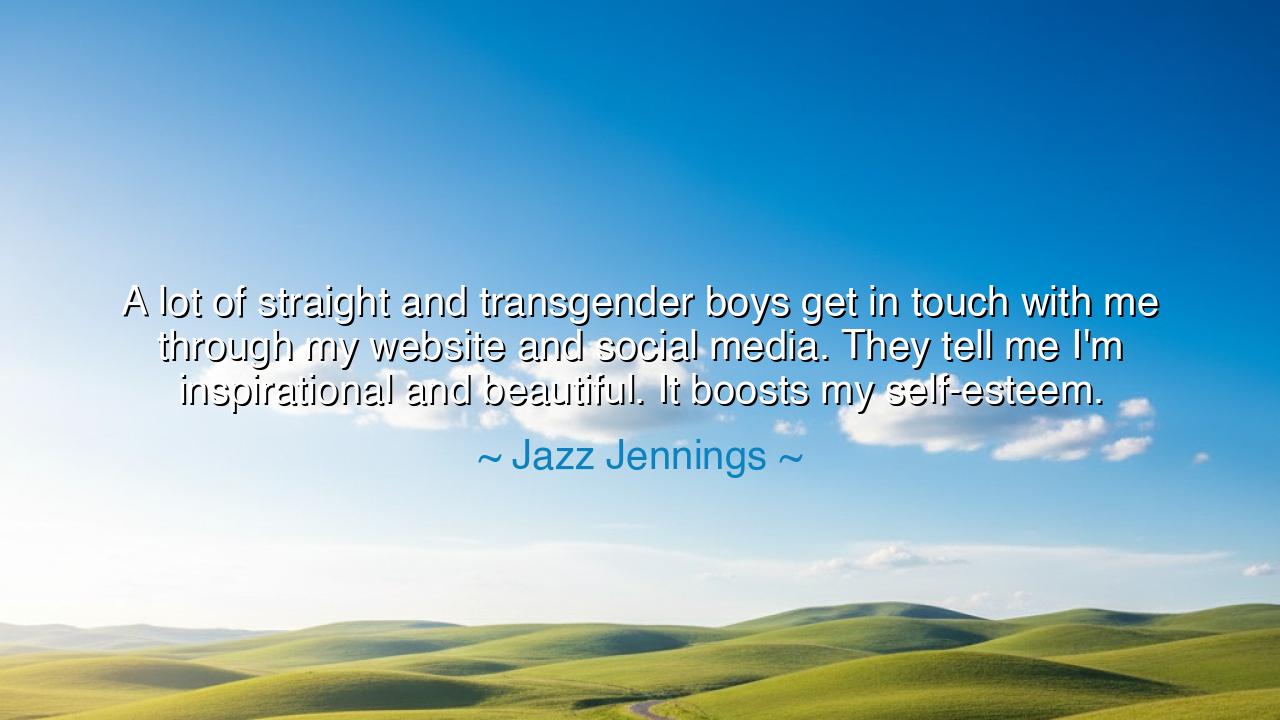
A lot of straight and transgender boys get in touch with me
A lot of straight and transgender boys get in touch with me through my website and social media. They tell me I'm inspirational and beautiful. It boosts my self-esteem.






In the heartfelt words of Jazz Jennings, we hear the voice of courage wrapped in grace: “A lot of straight and transgender boys get in touch with me through my website and social media. They tell me I'm inspirational and beautiful. It boosts my self-esteem.” Behind these words lies a truth both tender and powerful — the truth that affirmation, when born from compassion, has the power to heal, to restore, and to remind us that we are never alone in our struggles. Jazz, a young woman whose life has unfolded under the eyes of the world, speaks not from vanity, but from gratitude — for in the act of inspiring others, she herself finds strength renewed.
The origin of this quote comes from Jazz Jennings’s journey as one of the most visible transgender youth advocates of her generation. From childhood, she lived her truth openly, sharing her story through interviews, documentaries, and her own writings. In doing so, she became a beacon for those who felt unseen, a living reminder that identity is not a limitation but a declaration of authenticity. When she says that the messages she receives “boost her self-esteem,” she reveals the sacred exchange between inspiration and affirmation — for in giving courage to others, she receives it in return. This is the eternal rhythm of the human spirit: we strengthen each other by recognizing the divine within one another.
In ancient times, the poets and philosophers spoke often of the power of recognition — the act of seeing another truly, beyond appearances. The Greek philosopher Plato taught that love begins in recognition: the soul perceiving in another the beauty it once glimpsed in eternity. Jazz’s experience reflects this ancient truth. When others reach out to her — be they straight or transgender, young or old — they are not merely offering compliments. They are acknowledging the beauty of authenticity, the bravery of a soul that stands unshaken in its truth. And in that recognition, both giver and receiver are uplifted.
Such affirmation has changed the course of history before. Consider the story of Eleanor Roosevelt, who once faced great insecurity about her appearance and worth. Yet as she gave voice to others — to the poor, the oppressed, the voiceless — their gratitude transformed her. “No one can make you feel inferior without your consent,” she declared, having learned that confidence grows not in isolation, but through connection. Like Jazz, she discovered that strength is not merely found within, but also reflected back from those who see us for who we are.
Jazz’s words also reveal a profound lesson about the circle of inspiration. So often, we believe that to inspire others, one must already be whole and unbreakable. But in truth, inspiration flows most deeply from those who dare to be vulnerable. Jazz does not hide her humanity — her fears, her hopes, her longing for affirmation. By sharing them, she invites others to do the same. This mutual exchange of light — one person’s courage igniting another’s — is what transforms individuals into communities, and communities into movements. Her story is not just about identity, but about the universal human longing to be seen, valued, and loved.
The self-esteem that Jazz speaks of is not pride, but a reclamation of worth in a world that too often withholds it. When she receives messages of kindness, she is reminded that her journey matters — that her presence is not a burden but a blessing. And so, the act of others reaching out becomes a mirror of grace, showing her — and all of us — that our existence can be a source of beauty for others simply by being true. This is a lesson that transcends identity, reaching into the heart of what it means to be human: that our lives gain meaning not in isolation, but in reflection.
Let this, then, be the lesson we take from Jazz Jennings: to give and receive affirmation freely, to lift others even as we are lifted. Speak words of kindness when you see courage in another; tell them they are beautiful in their truth. For your words may become the spark that keeps another’s flame alive. And if others offer you encouragement, accept it with humility and joy, knowing that love and strength grow only when they are shared.
For in the end, as Jazz teaches us, inspiration is a living current — flowing from one soul to another, nourishing all it touches. Each of us is both the giver and the receiver, the student and the teacher, the one who inspires and the one who is inspired. And when we live in that exchange, we fulfill one of life’s oldest callings: to see and be seen, to love and be loved, and to remind one another that we are, and have always been, beautiful enough.






AAdministratorAdministrator
Welcome, honored guests. Please leave a comment, we will respond soon